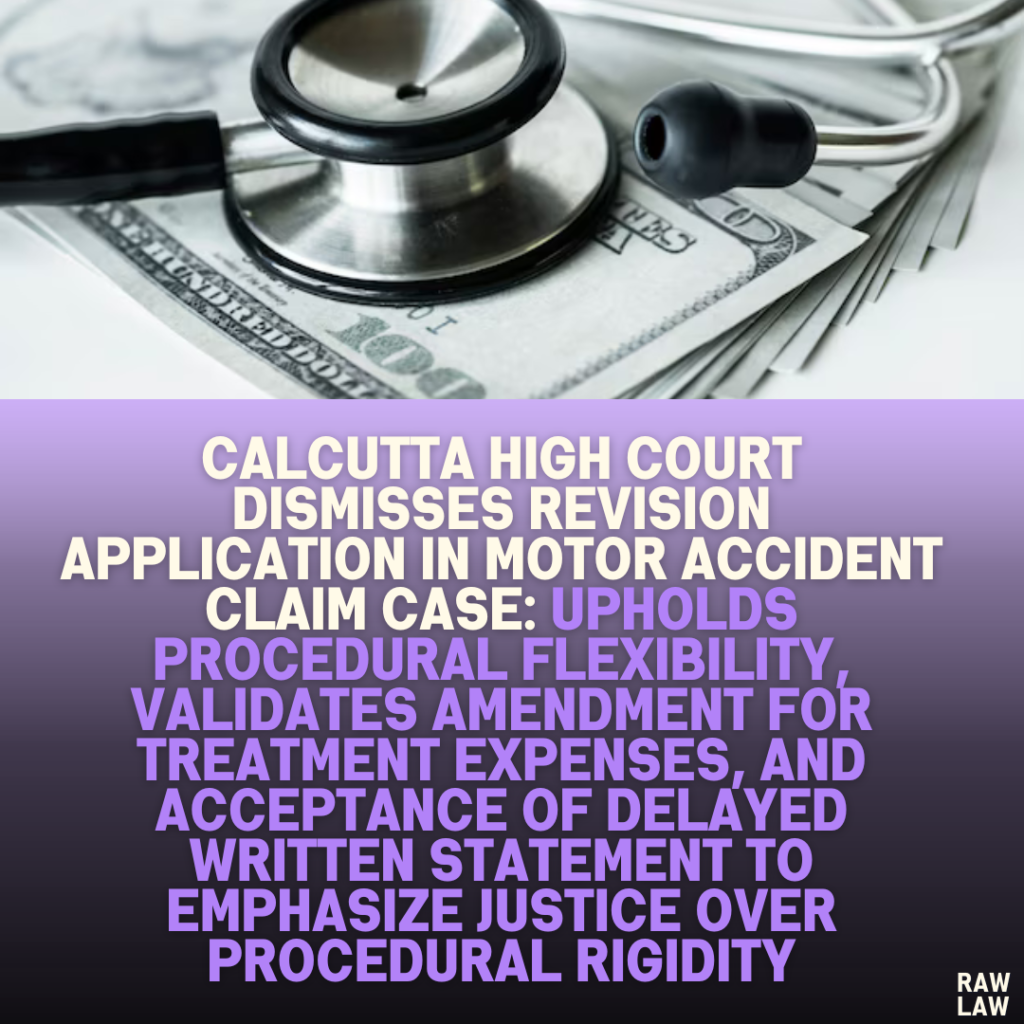Court’s Decision
The Calcutta High Court dismissed the revision application filed under Article 227 of the Constitution, challenging three orders passed by the City Civil Court, Calcutta, in connection with Motor Accident Claim Case No. 223 of 2015. The court upheld the procedural rulings, emphasizing that the decisions were made to address the real issues in controversy and ensure the proper administration of justice.
Facts
The petitioner contested three specific orders of the City Civil Court:
- Order No. 18 (31.07.2017):
The trial court allowed an amendment application filed under Order 6 Rule 17 of the Code of Civil Procedure (CPC) to include additional facts related to the claimant’s treatment expenses. The amendment was deemed necessary for determining the real questions in controversy. - Order No. 24 (04.07.2018):
The court rejected the petitioner’s application to recall the amendment order, stating that the application lacked merit and noting that the petitioner was absent at the time of the original amendment hearing. - Order No. 31 (10.06.2019):
The trial court accepted a written statement filed by the insurance company two years and six months after the summons, imposing a cost of ₹5,000 on the company for the delay. The court justified its decision by citing the need to ensure justice and effective representation.
Issues
- Was the amendment to the claim application under Order 6 Rule 17 CPC validly granted?
- Did the trial court err in rejecting the application to recall the amendment order?
- Was the acceptance of a delayed written statement by the insurance company lawful and fair?
Petitioner’s Arguments
- The trial court improperly allowed the amendment without applying the proviso to Order 6 Rule 17, which requires due diligence for amendments after the commencement of the trial.
- The petitioner’s counsel was not present when the amendment was granted, resulting in procedural unfairness.
- Accepting the insurance company’s delayed written statement violated the mandatory timelines prescribed under Order 8 Rule 1 CPC, causing prejudice to the petitioner.
Respondent’s Arguments
- The amendment was necessary to include subsequent developments, such as treatment expenses incurred by the claimant, which were crucial for adjudicating the claim.
- The acceptance of the delayed written statement was justified as it ensured proper representation by the insurance company, which is essential for complying with any compensation award.
Analysis of the Law
1. Order 6 Rule 17 CPC: Amendment of Pleadings
The provision grants courts the discretion to allow amendments at any stage if they are necessary to resolve the real questions in controversy. However, amendments sought after the commencement of the trial require the applicant to demonstrate due diligence.
In this case, the amendment pertained to subsequent events (treatment expenses) and did not change the nature of the claim. The court held that the trial court acted within its powers by allowing the amendment since the proviso to Rule 17 did not apply to this situation.
2. Order 8 Rule 1 CPC: Filing of Written Statements
Order 8 Rule 1 CPC prescribes a 90-day timeline for filing written statements. However, the Supreme Court in Kailash v. Nanhku clarified that the provision is directory and not mandatory, allowing courts to grant extensions in exceptional cases.
In this case, the insurance company filed its written statement two years and six months after receiving the summons. The trial court justified the delay by imposing costs and emphasizing the importance of the insurance company’s representation in compensation matters.
Precedent Analysis
- Rajesh Kumar Aggarwal v. K.K. Modi
Courts should allow amendments that help resolve the real questions in controversy, provided they do not prejudice the opposing party. - Kailash v. Nanhku
The 90-day limit for filing written statements is not mandatory. Courts can grant extensions in exceptional cases where failure to do so would result in grave injustice. - Mohammed Yusuf v. Faij Mohammad
While the timeline for filing written statements is directory, extensions should only be granted in rare and justified circumstances to prevent procedural delays.
Court’s Reasoning
- Amendment to Pleadings:
The amendment to include treatment expenses was justified as it pertained to subsequent events and did not alter the basic structure of the claim. The trial court’s decision was consistent with the principles outlined in Rajesh Kumar Aggarwal. - Rejection of Recall Application:
The petitioner failed to provide valid reasons for recalling the amendment order. The trial court noted that the petitioner was absent during the original hearing, and the amendment was necessary for adjudicating the claim. - Acceptance of Delayed Written Statement:
The court emphasized that procedural laws are tools to facilitate justice, not hinder it. The insurance company’s representation was deemed critical for compliance with any final award. The imposition of costs ensured that the delay did not unduly prejudice the petitioner.
Conclusion
The High Court upheld the trial court’s orders, emphasizing the need for procedural flexibility in cases involving compensation claims. It dismissed the revision application, finding no irregularity or perversity in the lower court’s decisions.
Implications
- The judgment reaffirms the discretionary powers of courts to allow procedural deviations in exceptional cases, particularly in non-commercial matters like motor accident claims.
- It underscores the principle that procedural laws are meant to aid justice rather than obstruct it.
- The decision ensures that parties critical to the resolution of the dispute, such as insurance companies in compensation claims, are adequately represented.
This judgment highlights the judiciary’s commitment to balancing procedural compliance with the principles of justice and equity.
